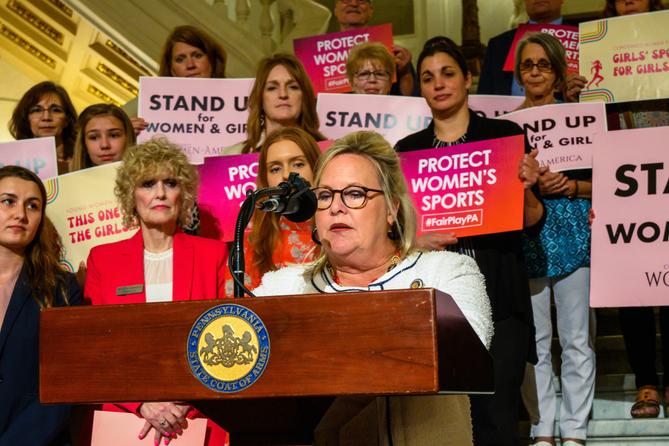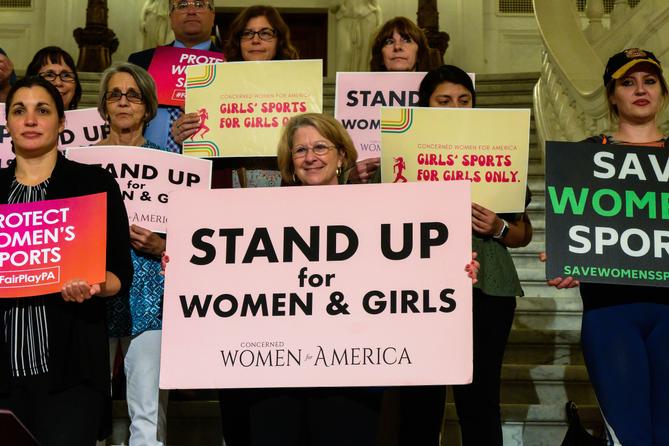Spotlight PA is an independent, nonpartisan newsroom powered by The Philadelphia Inquirer in partnership with PennLive/The Patriot-News, TribLIVE/Pittsburgh Tribune-Review, and WITF Public Media. Sign up for our free newsletters.
Update, July 8: Gov. Tom Wolf has vetoed HB 972, introduced by State Rep. Barbara Gleim (R., Cumberland).
“The fact that this bill passed through Pennsylvania’s Republican-led General Assembly solely to bully and oppress vulnerable children is atrocious,” he said in a statement. “These members should be ashamed of themselves for proposing and voting on policies that are discriminatory, unnecessary, and incredibly harmful.”
Original story
HARRISBURG — A coalition of Pennsylvania lawmakers and activists recently gathered on the Capitol rotunda steps with one mission in mind: passing a law separating sports teams by sex.
Legislation titled the Protect Women’s Sports Act would ban transgender girls and women, in grade school through college, from participating on the team that corresponds to their gender. It also would prohibit organizations like the NCAA from investigating or taking action against schools for following the law.
“Over the past half-century, we have fought to protect athletic opportunities for female students,” State Sen. Judy Ward (R., Blair), one of the main sponsors of the legislation, said at a rally in early June. “And now these opportunities are in jeopardy.”
During the event, speakers misgendered transgender athletes and called Lia Thomas — a former University of Pennsylvania swimmer who won a national championship — by her birth name, a practice known as deadnaming. Some speakers argued against the very existence of transgender people while claiming they pose a threat to women’s sports.
The two bills under consideration in Pennsylvania — HB 972 introduced by State Rep. Barbara Gleim (R., Cumberland) and SB 1181 from Ward and State Sen. Kristin Phillips-Hill (R., York) — contain some of the same language as a law passed in Idaho that is being challenged as unconstitutional.
A lawmaker there wrote the legislation with the Alliance Defending Freedom, a legal advocacy organization that the Southern Poverty Law Center has designated a hate group. (After the publication of this article, a representative from ADF disputed this designation. “The truth is, Alliance Defending Freedom is among the largest and most effective legal advocacy organizations dedicated to protecting the religious freedom and free speech rights of all Americans,” the persons said via email.)
Supporters of the legislation argue that transgender women have an unfair physical advantage when competing in women’s sports. But experts who study the performance of transgender athletes said a blanket ban like the one proposed in Pennsylvania is “anti-evidence.”
In grade school, such a ban would be exclusionary and unnecessary, they said, noting that — especially at the youth level — sports are inherently unfair. During adolescence, children develop at different paces and may have different advantages based on genetics and access to training.
Some restrictions make sense for adult athletes, the experts said, while also noting that research on the effects of gender-affirming hormone therapy over time shows it can negate some of the physical advantages of male puberty.
Both the state House and Senate bills have passed their chambers and are awaiting further consideration. Democratic Gov. Tom Wolf has vowed to veto the legislation if it reaches his desk.
But Wolf’s time in office is coming to an end, as he is term-limited from seeking reelection this November.
State Attorney General Josh Shapiro, the Democratic gubernatorial candidate, has backed Wolf and called such legislation “cruel.” Republican nominee for governor Doug Mastriano, a state senator from Franklin County, cosponsored the legislation.
“We are in a day when good is called evil and evil is called good,” Mastriano said recently on the state Senate floor before the chamber passed Ward and Phillips-Hill’s bill in a near-party-line vote. “There’s nothing right about this here.”

The legislation’s progress in Pennsylvania comes amid a surge in attacks against the LGBTQIA+ community nationwide.
Texas has ordered the investigation of parents who seek gender-affirming care for their transgender children and equated the act with abuse, while at least 14 other states have restricted or banned access to gender-affirming health care for youth. In legislation nicknamed the “Don’t Say Gay” bill by opponents, Florida has banned early elementary teachers from mentioning anything related to sexual orientation or gender identity.
Two Pennsylvania state senators — Lancaster County Republicans Ryan Aument and Scott Martin — want the commonwealth to follow suit. Their bill would ban classroom instruction on gender identity and sexual orientation in elementary schools and ban schools from withholding information, such as a student’s gender identity or sexual orientation, from a student’s parents, except in certain circumstances. Central Bucks School District and Pennridge School District have already adopted similar district-level policies.
In a statement responding to this article, Aument and Martin said in a statement the bill “does nothing to prohibit organic, student-initiated discussions of sexual orientation and gender identity for any age group.”
“This bill is absolutely not an ‘attack’ on the LGBTQIA+ community, and our goal is certainly not to ostracize, demonize, or harm LGBTQIA+ students in any way,” they said. “Rather, we want to find a fair solution that honors the very real concerns of parents that these sensitive topics are consistently being taught without their consent or knowledge to elementary school students. While we may not all agree on what moral, ideological, and religious values to teach or not to teach our children, we can certainly agree that it should be up to the parent to decide.”
These efforts targeting queer and transgender people and allies are having a damaging and potentially deadly effect on LGBTQIA+ youth.
In a recently released report, the Trevor Project, an LGBTQIA+ suicide prevention nonprofit, found that 83% of transgender and nonbinary respondents are worried about transgender sports bills, and almost three-quarters face discrimination because of their gender identity. Research has found that transgender youth are three times more likely to report depression and suicide attempts than their cisgender peers, and legislation like the sports bills can worsen the situation.
“Trans girls are as equally deserving of these opportunities as their cisgender peers,” Preston Heldibridle, the executive director of the LGBTQIA+ advocacy organization the Pennsylvania Youth Congress, said earlier this year. “They do not deserve to be routinely and pointlessly scapegoated by adult politicians during primary election season.”
An ‘anti-evidence’ ban
In testimony before the state House Education Committee in March, Gleim said that allowing transgender women and girls to compete in women’s and girl’s sports “reverses nearly 50 years of advancement for women,” citing biological differences between men and women.
Experts in the performance of transgender athletes don’t dispute the advantages that people who have gone through male puberty experience, but said focusing on those details oversimplifies the issue.
Pre-puberty, boys and girls have similar athletic abilities. Joanna Harper — a transgender runner, a doctoral student at Loughborough University in the United Kingdom, and a leading researcher in transgender athletic performance — called the idea of keeping transgender girls out of girls’ sports before puberty “ridiculous” in an interview with Spotlight PA.
In high school, there is already a variation in height, body shape, size, and strength between cisgender athletes, according to Christina Roberts, head of Mercy Children Kansas City’s adolescent medicine department. Hormone therapy can “wipe out” advantages outside the normal range of cisgender girls’ abilities, she said.
Transgender children can also begin gender-affirming care before puberty. The use of pubertal blockers prevents individuals from going through puberty, meaning they won’t have the potential advantages of the chemical and physical changes that puberty causes. In people assigned male at birth, those edges include higher testosterone levels, greater strength, and increased height.
Both bills under consideration in Pennsylvania would put a transgender girl who never went through male puberty at a disadvantage against cisgender athletes on a boy’s high school team.
“XY genetics don’t matter much if you’ve never had testosterone,” Roberts said.
Harper and Roberts told Spotlight PA that some restrictions make sense at the collegiate and Olympic levels, depending on the sport.
Though there’s not a lot of research on the topic yet, they said existing studies suggest that two or more years of hormone therapy for transgender women who have gone through puberty can negate some advantages, such as endurance, and cause reductions in others, such as strength.
Performance in athletics isn’t determined just by physical attributes. Mental health, quality of sleep, coaching, skills, and diet all play a role in how an athlete performs.
Harper has found that advantages in height, strength, and size can remain for athletes after two years, but that doesn’t always translate to a performance advantage across the board because each sport requires a different skill set. Hormone therapy can actually take a toll in endurance sports, but may not affect strength-based sports as much.
“Their larger frames are now being powered by reduced muscle mass, reduced aerobic capacity that can lead to disadvantages in things like endurance recovery and quickness,” she said.
Roberts believes that the rules at the NCAA and professional level should be determined from sport to sport, since hormone therapy can be enough to take away advantages in endurance sports, such as running and swimming.
The NCAA recently changed its policy to allow for individual sport-by-sport rules with a focus on inclusivity. In 2021, the International Olympic Committee also issued new inclusivity-focused guidelines due to the lack of available research, delegating rules to individual sports commissions, a shift away from previous testosterone testing requirements.
Harper disagrees with the new rule, saying the IOC dismissed the 30 experts it consulted, and warning that the policy is already having the opposite effect — sports committees have started to enact more restrictive rules than necessary.
Last week, the International Swimming Federation (FINA) introduced restrictions on transgender women. The new rules — reportedly created in consultation with medical and legal experts, as well as retired athletes and coaches — say transgender women can only participate in women’s sports if they transitioned by age 12 and have not experienced the physical changes of puberty. Trans men, however, are allowed to participate in mens swimming if they’re undergoing hormone therapy.
This week, a day after FINA’s restrictions went into effect, the International Rugby League announced a total ban on transgender women in women’s competitions — one of the strictest restrictions on transgender women’s participation in elite-level sports.
FINA’s policy argues that cisgender women need sex-based separation so they can win competitions, although a spokesperson for the group told the Associated Press that there are no transgender women competing at elite levels.
Out transgender athletes participated in the 2020 Summer Olympics in Tokyo but they didn’t dominate the competition. Laurel Hubbard, a transgender weightlifter from New Zealand who was the center of controversy because she transitioned later in life, didn’t complete any of her lifts and didn’t qualify for a medal.
“Eleven years after trans women were first allowed in, they’re not dominating women’s sports; they’re still hugely underrepresented,” Harper said. “And I think that’s an indication that whatever advantages trans women have, there are numerous disadvantages as well.”

A ‘convenient target’
Supporters of legislation banning transgender girls and women from sports teams that align with their gender frame it as a civil rights issue and an effort to maintain the protections of Title IX, which banned sex-based discrimination in programs that receive federal funding.
Some go even further and espouse the belief rooted in eugenics that transgender people are a threat to society and shouldn’t exist.
“These lies are devastatingly harmful to the transgender children themselves,” a parent of a student-athlete who did not give her name said at the Capitol recent rally. “It’s harmful to tell a child they can be something they’re not.”
Opponents of the legislation said it not only harms transgender youth, but it could also promote discrimination against cisgender women who, as one student-athlete put it, “don’t fit into the expected mold.”
Bills in other states include guidance on what to do if someone disputes an athlete’s sex. Advocates fear that any girl, trans or cisgender, who doesn’t look “girly” enough will be forced to go through invasive procedures such as genital examinations to play sports.
Pennsylvania’s legislation doesn’t specify how to determine an athlete’s sex, only that the distinction is required.
But athletes worry the scope of such bills could widen to affect all girls. “Trans children happen to be a convenient target at the moment,” Olivia Heim, a cisgender athlete from Hempfield High School, said at a Pennsylvania Youth Congress news conference in March, “but any girls who don’t fit the expected mold face the sting of being targeted.”
Heim said she didn’t fit stereotypical views of what a girl should be growing up. She was bullied and said it kept her from joining sports teams when she was in elementary school.
“Despite my clear love of the games,” she said, “I never felt like I would have a place on any team, even though I was a cisgender female.”
Opponents of the legislation also said lawmakers should focus on actual inequities between girls’ and boys’ teams. Despite Title IX, many girls’ teams still struggle with unequal funding, training, and other issues.
Kelsea Dague, a student-athlete from Hempfield, in Westmoreland County, said in a letter to a state House committee that the men’s lacrosse team at her school had access to larger facilities and didn’t have to pay for their equipment. Members of the women’s team, meanwhile, have to provide their own protective gear.
“Fairness in athletics should be about expanding the opportunities for women’s athletic programs to increase the level of participation and create more opportunities,” Dague wrote, “not reducing opportunities for women to play women’s sports.”
Update, June, 21 2022: This story has been updated to include newly announced restrictions on transgender woman’s participation in elite-level rugby and swimming.
WHILE YOU’RE HERE … If you learned something from this story, pay it forward and become a member of Spotlight PA so someone else can in the future at spotlightpa.org/donate. Spotlight PA is funded by foundations and readers like you who are committed to accountability journalism that gets results.
